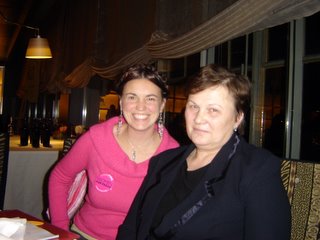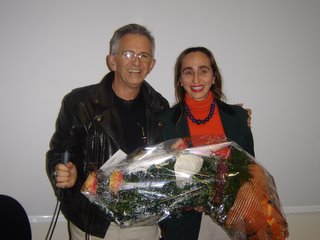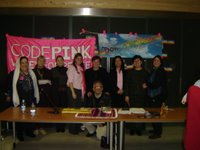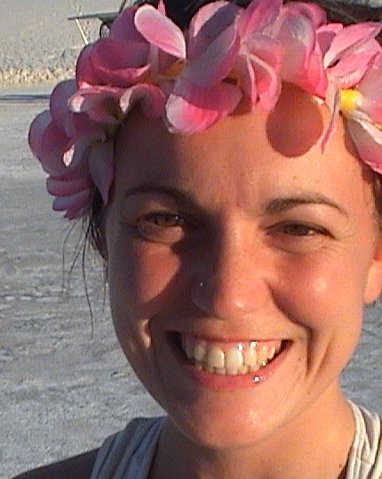
During the first week of December I was blessed with the opportunity to travel to Italy to take part in the 2005 Donne di Pace (Women of Peace) tour. What follows is an account of my own presentations, and then short bios of the women of peace written from my perspective, as well as a chronological narrative about the trip. For the full text blog, please visit http://ravenjournal.blogspot.com.
As the youngest Donne di Pace, my talks are always prefaced by my age and an emphasis on my youth. People repeatedly want to know why I do this work at such a young age, so I have become quickly accustomed to speaking about my personal experience—a bit about my life story—domestic violence, contemplation of military service, college scholarship, environmental justice work, travels, etc.—and how I can see the universality of peace from the individual to the galaxy, and also how this work is a choice that does not resemble a choice (see the poems entry), in that I feel it is my duty to do this work.
In every lecture, I describe CODEPINK (Codice Rosa: Donne di Pace), detailing our mission statement as follows: CODEPINK is a women-initiated grassroots peace and social justice movement working to end the war in Iraq, prevent future wars, and redirect our resources into education, healthcare, and life-affirming activities. I also speak about how CODEPINK includes men, while primarily aiming to build capacity and confidence in women to take action politically, because we have been disenfranchised from the political process. I speak about how Costanzo is a model CODEPINK Man for Peace: he has dedicated his life to documenting women’s stories and conflicts through film and by coordinating of speaking tours; and he has mastered the art of “stepping up and stepping back,” creating spaces for women to speak their truth without an authoritarian or guiding demeanor; he lifts up those around him while not compromising his own personal strength.
I speak about CODEPINK’s campaigns, namely counter-recruitment, the local cost of war, legislative actions, dogging public officials, and raising our voices against the war in creative ways on the grassroots level (through our over 250 local groups) at vigils, demonstrations, in classrooms, with overpass banner drops, etc. I talk about how these methods and others are helping to chip away at the pillar of war and corrupt power that we are up against, and how we are seeing more and more victories as time passes (the military not meeting recruiting goals, public opinion favoring a pull out of Iraq, legislative bills such as McGovern and Murtha’s work, the weakening of the “coalition of the coerced,” the turning point at Crawford, Texas with Cindy Sheehan last summer, for example). I list some of the elements of a real exit strategy, including no permanent bases in Iraq, the intervention of international peacekeeping forces, and real rebuilding strategies not based on corporate profit.
I speak from the heart about my personal experience, the violence within my family, the divorce process that left my mother and I with little money and pushed me to think about joining the military to get college, my experience speaking out against domestic violence in high school and the empowerment and confidence this gave me, my scholarship award and college experience, and my subsequent environmental activism and social justice work, with the understanding that violence between people and the earth, or between two cultures or countries, is no different really from the violence between two people, within a family. (How is that for a run-on sentence?) Luckily, most of the speaking engagements were translated, so I had time to breathe and really feel out what I wanted to say between each phrase or idea.
At the speaking event in Aosta on Sunday, I included in my personal story the account of my experience in El Salvador, the lifting of my deep depression caused by my experience of the joy and light of the families I worked with and dually my awareness of the immense suffering—loss of people to the civil war, the hurricane, and the earthquake—of the people there. I talked about the Western anti-depressant pop-a-pill culture and the way in which solidarity work that is done with compassion and in an interfaith way can open the heart and clear the mind. I then bridged this
At the University of Udine, I asked the packed classroom of conference attendees several questions: How many of you are high school students? About 30! How many are college students? The majority. I spoke a lot about student activism and the power of the individual to make a difference. I get the sense from the Italian youth that I speak with that they are wholly aware of what is going on politically, specifically with reference to the Berlusconi administration, Berlusconi’s control (i.e. ownership) of the media, the war in Iraq, the US imperialism. However, my Italian peers seem to feel unable to affect change with regard to these issues. Because colleges don’t have “campuses” the way we do in the US, it is harder to have clubs, associations, and school publications, such as a daily newspaper or journal, virtually don’t exist. I do learn that there is a Women in Black group in Udine, and there was a project called the Peace Tent for a while, which was set up at the weekly market in the plaza, the center of town, and featured info about the war. Because the war has dragged on for so long, this project is no longer in existence.
In Milan at the Peace House, I open with a particular thank you to the Peace House organizers who have launched the campaign for clemency for Stan Tookie Williams. I speak about my personal experience and about CODEPINK, and then I note that during a previous woman’s presentation, the CODEPINK Women for Peace banner half fell down so that only the “Women for” part was visible. I talked about how sometimes in our activism it is easy to be anti-Bush, anti-corporate America, anti-war, but we can lose sight of what we are for—peace, environmental justice, equality, joy, the celebration of diversity and unity. During Zalina’s presentation, she apologized for being so emotional. During my talk, I spoke about how I believe that it is this emotional vulnerability that our world so desperately needs, that this warming energy is what women can often offer, since it may still be more socially acceptable for us to emanate our emotions. I also spoke about the universal language of peace, which transcends our issues of communication between Italia, Russian, English, and also, at this event sign language—a couple with a baby came who were hearing impaired. I sat with them throughout the event and wrote down what was being said in mixed English, Italian, and pictograms. I discovered that they had come from far away to see Habiba, because she helped them when they were having difficulty getting pregnant, and now, after two years, they wanted her to meet their two-year-old child, Lapo.
At the Aosta event, I spoke at first about gratitude. Grandmother Sarah had said that Gratitude leads to Knowledge, and one of the government officials said that Knowledge leads to the absence of doubt or fear, which leads to no violence (it sounds a bit awkward because I am reversing what the latter said—rather than saying “without knowledge”…). I suggested that in our modern world our society has forgotten the importance of gratitude; in our rushing, our consumption of fast food affords no time for blessing; we rarely pay enough gratitude to our mothers, to our ancestors, to the earth that feeds and holds us. I then talk about the lack of gratitude that we—the US—must have to continue to fight a war based on lies on the very soil that was the cradle of life, fertile Mesopotamia, where the currently political borders of Iraq are now situated. Then I add that from gratitude we arrive at inspiration, and inspiration leads us to dream, to hope, and to work for change. I talk about how peace is not only the absence of violence, but is the cultivation of compassion, kindness, friendship, and respect. This is why it was not enough for me to escape the suffering I experienced as a child; I needed to engage in activities affecting compassion and kindness outward (and inward). During this talk, I incorporated into my personal story my work in El Salvador, my depression during college, and a conversation about how even amidst all the suffering I witnessed in the families I had worked with in Salvador—loss of life from the 12 year civil war, the hurricane, the earthquake, and damaging development initiatives from foreign superpowers—there was a pervasive joy and a celebration of life that was astounding. I said that it is this quality of joy that we must cultivate in our activism, so that we know what we are fighting for, and we embody the spirit of peace. I talked about how this spirit of humor and celebration was what enticed me to want to work with CODEPINK, and then I went through my CODEPINK spiel, including the pillars of war and how we are working to chip away at the foundation and build a new paradigm. I said that we must all be midwives of peace, assisting our loved ones, and our enemies, in the spiritual and practical birthing or manifestation of peace. This means also helping those in power—men, presidents, terrorists, etc.—find peace. I brought up my concern that often people go to conferences and lectures and become intrigued and inspired, but leave and go back to their lives, business as usual. I held up the sign up sheet and encouraged folks to sign up and also to put down a new year’s resolution for peace in the notes section. At the beginning of the event the regional senator spoke about how the Aosta region is known for its mountains, mountains which carry a deep mystic nature, and also hold the history of warfare, as they were a strategic battle staging ground. I added to this description the metaphor of a mountain as a power hierarchy, and I talked about how what we so desperately need are not more powerful solitary leaders, but rather a new paradigm in which people work together and feel empowered to affect change in their everyday lives. I reminisced about the Peter Pan fable in which the children are asked to clap if they believe in fairies, and told that every time a child stops believing in fairies, a fairy dies. I asked the audience to clap if they believed in peace, and I talked about how if we stop believing that a world without war is possible, then indeed more innocent people will continue to die. And then I reasserted that it is not enough to believe, we must act. I held up the day’s local newspaper and showed the audience an article about Alice Walker and then read the last paragraph from her essay in our book, which talks about making peace with joy. After this event many people had questions and wanted to sign up for CODEPINK. The local government gave us each a big, colorful book with photos of Aosta and a history (with English!) of the region. I was intrigued to learn that Aosta is an independent region within Italy and has been independent since after WWII. As an independently governed region, they are financially autonomous, using their own discretion to spend collected tax income, and they make their own local laws, school systems, and healthcare facilities. If only we could do that in California…
On the last day we speak in Torino at a high school built in a building that used to be a bomb manufacturing facility—talk about transformation! I have a short amount of time to speak so I focus on the young women in the audience and talk about having self-confidence and courage. Then I ask the whole group to raise a hand if they are activists; of course, there are almost no hands in the air. So I ask if anyone has helped their parents during a difficult time, then if they’ve helped a friend in need, if they’ve done something to make the earth a more beautiful place, to protect the environment—recycling, etc., and finally if they’ve spoken out when they saw something unjust happening. By the end of all these questions, every hand has gone up at least once. So then everyone is an activist, I tell them. I talk about how being an activist is looking out for the common good for your community, and how one person can become an activist by transforming individual acts for the family or for friends into acts for the larger town or country or the world. I talk about the way that military recruitment works in the US and why we think that while the US is fighting offensive wars based on lies, the military is not a real job opportunity.
Finally, at the end of every event, I encourage the participants to take action, and I list some of the actions from our 10 things to do to stop the next war now essay by Medea in the book.
These are my favorite passages from the CODEPINK Stop the Next War Now book to quote during the speaking events:
"We were women and children who loved ourselves in the form of Iraqi women and children because we knew that to love ourselves as humans meant to love ourselves as all humans. We understood that whatever we did to stop war, we did it not for the 'other' but for a collective us. The heart enjoys experiencing the liberating feeling of compassion; it actually expands and glows, as if beaming its own sun upon the world. That is the warmth our cooling emotional world so desperately needs to preserve its humanity. It is the savoring of the ecstatic nature of impersonal love that lets the peacemakers of the world do our job. It is this love whose inevitable companion is not only peace, but happiness and... joy." --Alice Walker
"Individuals have international duties which transcend the national obligations of obedience. Therefore [individual citizens] have the duty to violate domestic laws to prevent crimes against peace and humanity from occurring." --Nuremberg War Crime Tribunal, 1950
"The new paradigm will not be about conquering people, but about collaborating with people. It will not be invading people, it will be inviting people. Not occupying, but offering, inspiring, and serving people. In the new paradigm, there will be time to feel, to heal, to grieve. Unexpressed grief often becomes violence. Expressed grief becomes wisdom. As a nation, instead of grieving over September 11, we retaliated. We bombed." --Eve Ensler
"It isn't enough to talk about peace. One must believe it. And it isn't enough to believe in it. One must work at it." --Eleanor Roosevelt
"Women may be the one group that grows more radical with age." --Gloria Steinem
"We, the women of one country, will be too tender to those of another country to allow our sons to be trained to injure theirs." --Julia Ward Howe, 1870 Mother's Day Proclamation
"Life is a tragedy for those who feel, and a comedy for those who think. It is vital to mourn for the victims of this government but not at the expense of losing our sense of humor. Our ability to laugh coincides directly with our ability to fight. If we can make fun of it, we can transcend it." --Margaret Cho
"You were born with potential.
You were born with goodness and trust.
You were born with ideals and dreams.
You were born with wings.
You are not meant for crawling, so don't.
You have wings.
Learn to use them and fly."
--Rumi, 13th century














